

2017 was a challenging year for many Americans. The well-being of the average American dropped more in 2017 than in any year since the Gallup-Sharecare Well-Being Index began tracking it in 2008.
The Gallup-Sharecare Well-Being Index is based on interviews with over 160,000 U.S. adults aged 18 and older, and is intended to capture how people feel about their lives and what they experience on a daily basis. The index consists of five categories: sense of purpose, social relationships, financial security, relationship to community, and physical health.
Scores in each category vary greatly across the country. While residents in the Northeast, West, and Upper Midwest generally enjoy the highest levels of well-being in the country, the South and the Rust Belt are home to most states with the lowest well-being — and the regional divide is growing.
To determine America’s happiest and most miserable states, 24/7 Wall St. analyzed the results of the Gallup-Sharecare Well-Being Index. Survey results from Gallup were paired with other socioeconomic data from the U.S. Census Bureau, the FBI, and other sources.
Click here to see America’s happiest (and most miserable) states.
Click here to see our detailed findings and methodology.
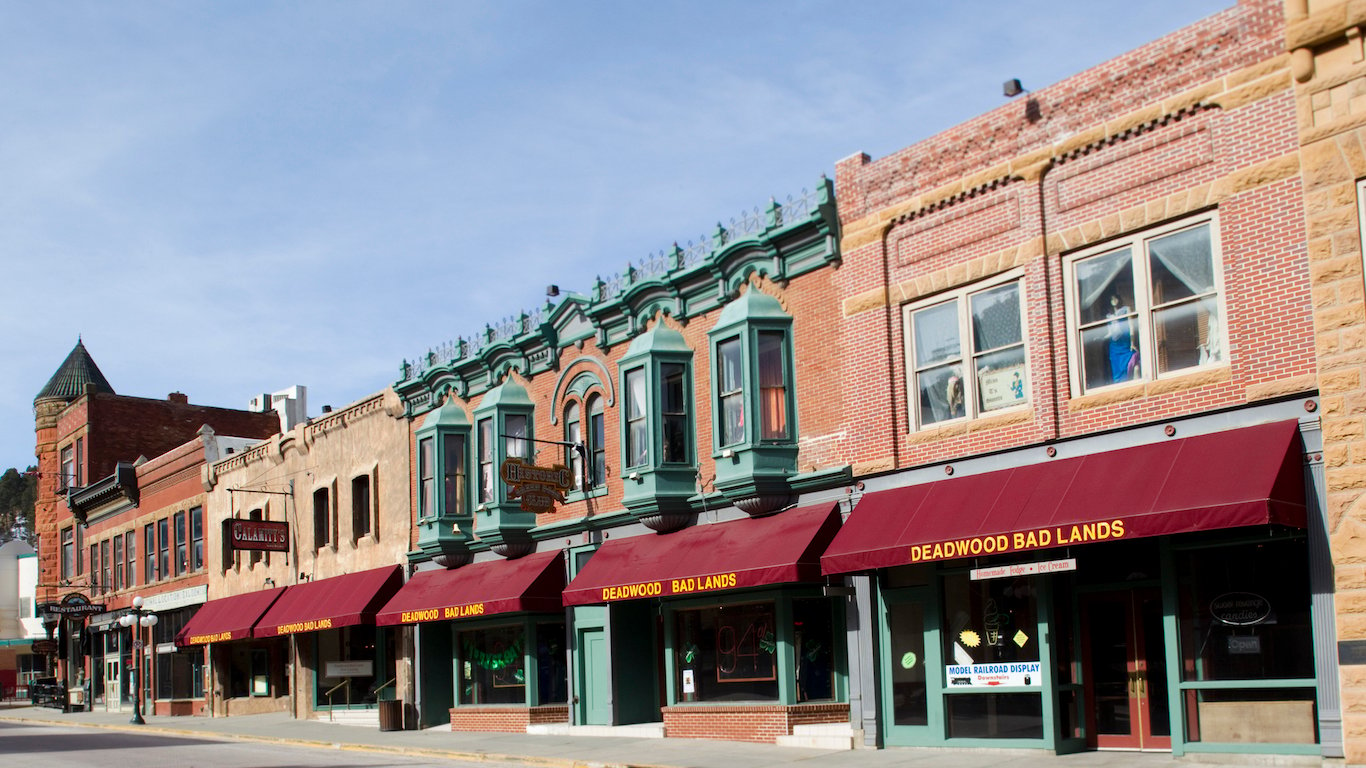
1. South Dakota
> Residents who like what they do every day: 82.3% (the highest)
> Residents w/ a strong social relationship: 78.0% (4th highest)
> Residents in near perfect physical health: 61.5% (the highest)
> Poverty rate: 13.3% (24th highest)
> Violent crime rate: 418.4 per 100,000 (19th highest)
According to a Gallup survey assessing different self-reported gauges of well-being, South Dakota ranks as the happiest state. State residents report a particularly high sense of purpose. In the survey, 82.3% of respondents agreed they liked what they do every day, 62.7% believed they have reached most of their goals in the past year, and 75.1% said they get to use their strengths in their daily work — each the largest share of any state. South Dakota’s healthy job market may help some workers in the state find a job that best utilizes their talents. Just 2.8% of the workforce is unemployed, the second lowest unemployment rate in the country. State residents also rank highly in financial health and community pride.
[in-text-ad]

2. Vermont
> Residents who like what they do every day: 75.2% (21st highest)
> Residents w/ a strong social relationship: 79.3% (the highest)
> Residents in near perfect physical health: 61.3% (2nd highest)
> Poverty rate: 11.9% (19th lowest)
> Violent crime rate: 158.3 per 100,000 (2nd lowest)
Based on a national survey assessing the five components of well-being — sense of purpose, social relationships, financial security, relationship to community, and physical health — Vermont residents are in better physical health than any other state. Nearly 60% of Vermont adults not exercise regularly, the sixth largest share of any state. Similarly, 62.4% of respondents report eating a healthy amount of fruits and vegetables weekly, the third largest share in the country. Just 19.2% of adults are obese, less than the nationwide adult obesity rate of 28.2% and the lowest of any state.
When surveyed about their their community, 86.5% of Vermont respondents always feel safe and secure. The state’s low violent crime rate likely contributes to the strong sense of safety among its residents. There were just 158 violent crimes per 100,000 residents in 2016, the second best of any state and less than half the national rate.

3. Hawaii
> Residents who like what they do every day: 78.3% (4th highest)
> Residents w/ a strong social relationship: 72.8% (6th lowest)
> Residents in near perfect physical health: 55.4% (16th highest)
> Poverty rate: 9.3% (2nd lowest)
> Violent crime rate: 309.2 per 100,000 (21st lowest)
When surveyed about their sense of purpose, 78.3% of respondents in Hawaii agreed they like what they do every day, and 55.7% agreed that they reached most of their goals in the past year — each some of the largest such shares of any state. One factor likely contributing to residents finding such a strong sense of purpose in their daily lives may be the state’s strong job market. Just 3.0% of Hawaii’s labor force is unemployed, the third lowest unemployment rate among states.
Hawaii residents also report a higher degree of social well-being than those of all but two other states. Of state resident surveyed, 78.9% report receiving positive energy from their friends and family on a daily basis, the largest share of any state. Additionally, 76.9% of adults in the state have someone in their life that encourages them to be healthy, also the largest share of any state.

4. Minnesota
> Residents who like what they do every day: 77.9% (5th highest)
> Residents w/ a strong social relationship: 77.0% (7th highest)
> Residents in near perfect physical health: 54.7% (21st highest)
> Poverty rate: 9.9% (6th lowest)
> Violent crime rate: 242.6 per 100,000 (9th lowest)
Based on a national survey assessing the five components of well-being — sense of purpose, social relationships, financial security, relationship to community, and physical health — Minnesota residents have a stronger sense of financial security than residents of nearly any other state. Just 10.5% of respondents report not having enough money to buy food, the second lowest share after North Dakota. Also, 49.2% agree they have enough money to do everything they want — the second highest share of any state other than North Dakota. The area’s high median income is likely one factor contributing to the strong sense of financial security among Minnesota residents. The typical Minnesota household earns $65,599 a year, nearly $8,000 more than the national median household income. Just 9.9% of residents live in poverty, the sixth lowest poverty rate of any state.
[in-text-ad-2]
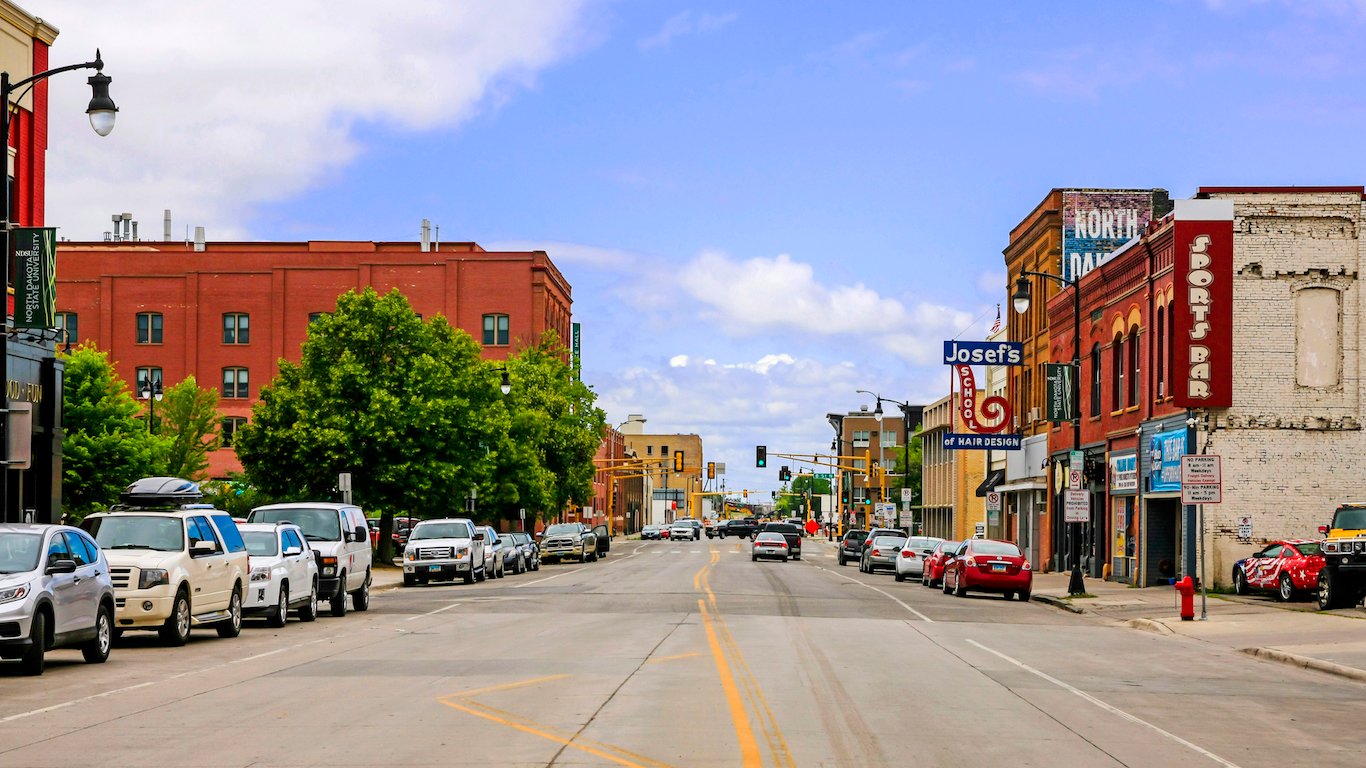
5. North Dakota
> Residents who like what they do every day: 81.6% (2nd highest)
> Residents w/ a strong social relationship: 78.1% (3rd highest)
> Residents in near perfect physical health: 57.7% (10th highest)
> Poverty rate: 10.7% (10th lowest)
> Violent crime rate: 251.1 per 100,000 (13th lowest)
When asked about their financial security, less than half of survey respondents in North Dakota said a lack of money prevented them from doing everything they want to do, and 43.9% reported they had not worried about money in the past week — each the smallest share of any state.
The state’s high incomes, low cost of living, and low unemployment likely contribute to the strong sense of financial security among residents. The typical state household earns $60,656 a year, or about $3,000 more than the U.S. median household income. Goods and services cost 7.7% less in North Dakota than they do nationwide on average. Just 3.2% of the state’s workforce is unemployed, less than the 4.9% national unemployment rate and the fifth lowest of any state.

6. Colorado
> Residents who like what they do every day: 75.4% (16th highest)
> Residents w/ a strong social relationship: 75.4% (21st highest)
> Residents in near perfect physical health: 57.1% (12th highest)
> Poverty rate: 11.0% (12th lowest)
> Violent crime rate: 342.6 per 100,000 (23rd lowest)
Colorado residents report a higher sense of physical health than residents of any state other than Vermont. Only 20.8% of residents have had high blood pressure in their lifetime, and just 18.4% have had high cholesterol — the smallest and second smallest such shares of any state. The positive health outcomes are likely due in part to the large number of outdoor recreational opportunities throughout Colorado and the healthy behaviors of state residents. An estimated 91.3% of the state’s population has access to locations for physical activity such as gyms and parks, far more than the 84.0% national average. Some 62% of adults in Colorado get an appropriate amount of exercise each week, the second largest share among states.
[in-text-ad]

7. New Hampshire
> Residents who like what they do every day: 76.9% (7th highest)
> Residents w/ a strong social relationship: 75.1% (23rd highest)
> Residents in near perfect physical health: 54.5% (23rd highest)
> Poverty rate: 7.3% (the lowest)
> Violent crime rate: 197.6 per 100,000 (3rd lowest)
In a national survey assessing the five components of well-being — sense of purpose, social relationships, financial security, relationship to community, and physical health — New Hampshire residents reported a higher degree of social well-being than nearly any other state. An estimated 52.5% of residents always make time for trips with friends and family, and 77.0% receive positive energy from their friends and family on a daily basis, the second and fourth largest shares of any state.
One factor that may contribute to the strong sense of social well-being may be the large share of children living in two-parent households, a factor that has been shown to have a positive effects on social development in numerous studies. Just 11% of children in New Hampshire live in single-parent households, nearly half the 21% national share and the seventh smallest share nationwide.

8. Idaho
> Residents who like what they do every day: 77.6% (6th highest)
> Residents w/ a strong social relationship: 75.1% (24th highest)
> Residents in near perfect physical health: 54.2% (22nd lowest)
> Poverty rate: 14.4% (19th highest)
> Violent crime rate: 230.3 per 100,000 (6th lowest)
An estimated 76.7% of Idaho residents are proud of their community or area they live in, the largest share of any state. Additionally, 74.6% of residents believe the area where they live is the perfect place for them, and 85.6% always feel safe and secure — each the second largest share nationwide. Idaho’s low violent crime rate may partially contribute to the strong sense of community pride and safety among state residents. There were just 230 violent crimes per 100,000 residents in 2016, far less than the national violent crime rate of 397 incidents per 100,000 Americans and the sixth lowest of any state. Idahoans also report a stronger sense of financial security, physical health, and purpose than a majority of states.

9. Utah
> Residents who like what they do every day: 76.7% (9th highest)
> Residents w/ a strong social relationship: 77.0% (8th highest)
> Residents in near perfect physical health: 54.2% (24th lowest)
> Poverty rate: 10.2% (7th lowest)
> Violent crime rate: 242.8 per 100,000 (10th lowest)
There were just 243 violent crimes per 100,000 Utah residents in 2016, the 10th lowest violent crime rate of any state and far less than the national rate of 397 incidents per 100,000 Americans. In most states with low violent crime rates, residents report a stronger sense of safety and community pride. In Utah, 82.5% of survey respondents agree they always feel safe and secure, and 69.3% of respondents believe the area where they live is the perfect place for them — the ninth and eighth largest shares of any state. Additionally, 73.6% of respondents say they are proud of their community, the third largest share in the nation.
Residents also have a strong sense of financial security, with only 6.4% reporting dissatisfaction over their standard of living — the smallest share nationwide. Just 4.2% of households in Utah earn less than $10,000 a year, the third lowest such share of any state.
[in-text-ad-2]

10. Montana
> Residents who like what they do every day: 75.6% (13th highest)
> Residents w/ a strong social relationship: 77.2% (5th highest)
> Residents in near perfect physical health: 53.8% (20th lowest)
> Poverty rate: 13.3% (24th highest)
> Violent crime rate: 368.3 per 100,000 (25th lowest)
Montana residents report a stronger sense of community than a majority of states. Only 5.4% of survey respondents report that they do not always feel safe and secure, the second smallest share in the country. Additionally, 68.9% of residents are proud of the area where they live, more than the 65.1% national average.
Montana residents also report some of the best health outcomes and behaviors of any state. An estimated 62.1% of residents exercise for at least 30 minutes three days a week, far more than the 55.0% national average and the largest share in the country. Only 24.5% of adults have had high blood pressure, and just 21.5% have had high cholesterol, each some of the smallest shares nationwide.

11. Massachusetts
> Residents who like what they do every day: 74.1% (20th lowest)
> Residents w/ a strong social relationship: 74.8% (25th highest)
> Residents in near perfect physical health: 59.4% (3rd highest)
> Poverty rate: 10.4% (9th lowest)
> Violent crime rate: 376.9 per 100,000 (23rd highest)
The typical Massachusetts household earns $75,297 a year, nearly the highest state median. Partly as a result, state residents are more likely than most Americans to be satisfied with their personal finances. Some 48% of survey respondents in the state say have enough money to do everything they want compared to only 42% of Americans nationwide.
A large segment of the Massachusetts population also benefits from strong communities. A low property crime rate is one of the hallmarks of a region where residents report relatively high well-being, and in Massachusetts there are just 1,561 property crimes per 100,000 residents, compared to the U.S. rate of 2,451 per 100,000. Indeed, 82.1% of adults in the state feel safe, a greater share than in the vast majority of states.
[in-text-ad]
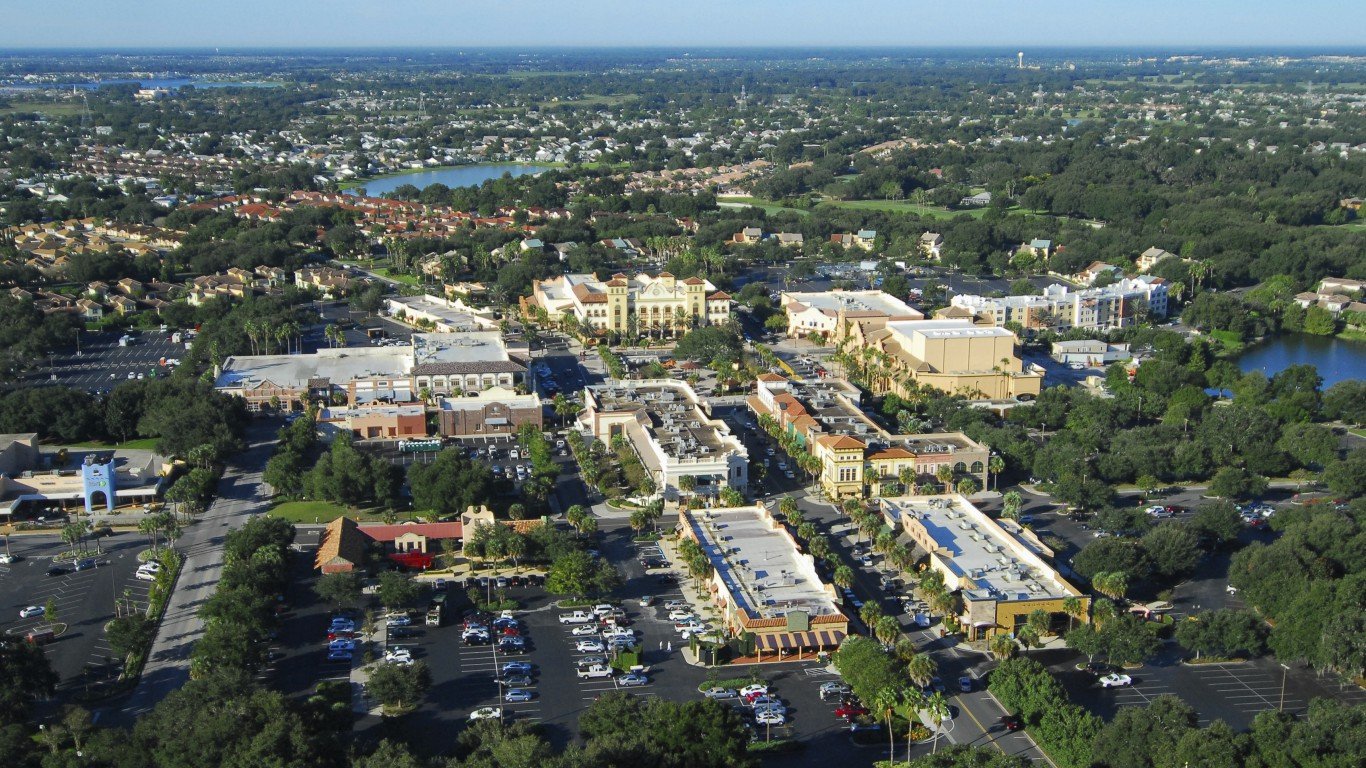
12. Florida
> Residents who like what they do every day: 75.3% (18th highest)
> Residents w/ a strong social relationship: 75.5% (18th highest)
> Residents in near perfect physical health: 57.7% (9th highest)
> Poverty rate: 14.7% (16th highest)
> Violent crime rate: 430.3 per 100,000 (18th highest)
When asked about their social relationships, 50.7% of Florida residents agreed that they always make time for trips with their friends and family, the seventh largest share of any state. Florida residents also report a strong sense of purpose. An estimated 66.8% of adults learn or do something interesting every day, and 55.2% believe they have reached most of their goals in the last year — each some of the largest shares of any state.
While factors such as low unemployment and high educational attainment can promote a strong sense of purpose across a population, Florida is fairly unremarkable in both of these categories. The state’s unemployment rate of 4.9% is in line with the national figure. Additionally, 28.6% of adults have a bachelor’s degree, less than the 31.3% national college attainment rate.

13. Texas
> Residents who like what they do every day: 76.9% (8th highest)
> Residents w/ a strong social relationship: 75.7% (16th highest)
> Residents in near perfect physical health: 57.1% (11th highest)
> Poverty rate: 15.6% (12th highest)
> Violent crime rate: 434.4 per 100,000 (17th highest)
Texas residents report a stronger sense of purpose than any state other than South Dakota. Approximately 77% of residents like what they do every day, and 70% believe they get to use their strengths on a daily basis, each some of the largest shares of any state. While residents in states with high educational attainment and low unemployment tend to report the strongest sense of purpose, Texas is relatively lacking in both of these categories. Just 82.9% of state adults have a high school diploma, the second smallest share in the country. Additionally, 4.6% of workers are unemployed, nearly in line with the 4.9% national unemployment rate.
Texas residents also report a stronger sense of social well-being, community, and physical health than a majority of states.

14. California
> Residents who like what they do every day: 75.5% (14th highest)
> Residents w/ a strong social relationship: 73.9% (11th lowest)
> Residents in near perfect physical health: 57.9% (8th highest)
> Poverty rate: 14.3% (20th highest)
> Violent crime rate: 445.3 per 100,000 (15th highest)
California residents report a higher degree of physical well-being than residents of any state other than Colorado and Vermont. High health status among adults is partially attributable to some good habits and the scarcity of some bad ones. For example, only 13.8% of adults in the state smoke, the third smallest share among states.
Additionally, 93.5% of the state population has access to locations for physical activity such as gyms and parks, the fourth largest share nationwide. Such access likely works to boost physical activity rates. Some 59% of adults in the state exercise regularly throughout the week, a larger share than in all but eight other states.
[in-text-ad-2]

15. Arizona
> Residents who like what they do every day: 78.5% (3rd highest)
> Residents w/ a strong social relationship: 76.7% (10th highest)
> Residents in near perfect physical health: 54.8% (19th highest)
> Poverty rate: 16.4% (8th highest)
> Violent crime rate: 470.1 per 100,000 (12th highest)
In a national survey assessing the five components of well-being, Arizona residents reported a stronger sense of purpose than nearly any other state. An estimated 68.7% of adults in the state learn or do something interesting every day, and 78.5% like what they do every day — the largest and third largest share of any state. While the opportunity to find a job that matches an individual’s strengths and abilities can lead to a stronger sense of purpose, Arizona has one of the worst job markets in the country. The state’s unemployment rate of 5.3% is far higher than the 4.9% national figure.
Arizona residents also report stronger social relationships than most states. An estimated 75.3% of adults have someone in their lives who encourages them to be healthy, the sixth largest share in the country.

16. Wyoming
> Residents who like what they do every day: 76.0% (11th highest)
> Residents w/ a strong social relationship: 79.1% (2nd highest)
> Residents in near perfect physical health: 53.9% (21st lowest)
> Poverty rate: 11.3% (14th lowest)
> Violent crime rate: 244.2 per 100,000 (11th lowest)
One of the strongest indicators of a community’s well-being is the prevalence of crime. There were 244 violent crimes per 100,000 residents in Wyoming in 2016, far less than the national violent crime rate of 397 incidents per 100,000 Americans. When surveyed about their community, 84.7% of respondents in Wyoming agreed they always feel safe and secure, the third largest share of any state. Additionally, 70.9% of respondents claimed to be proud of their community, the fifth largest share. In addition to positive relationship with their community, Wyoming residents report a stronger sense of purpose and financial security than the residents of a majority of states.
[in-text-ad]

17. Nebraska
> Residents who like what they do every day: 76.2% (10th highest)
> Residents w/ a strong social relationship: 75.6% (17th highest)
> Residents in near perfect physical health: 55.0% (18th highest)
> Poverty rate: 11.4% (15th lowest)
> Violent crime rate: 291.0 per 100,000 (17th lowest)
Nebraska residents report a stronger sense of community than a majority of states. An estimated 83.5% of adults always feel safe and secure, the sixth largest share of any state and far more than the 77.4% national average. One factor contributing to the shared sense of safety among residents may be the state’s low violent crime rate. There were just 291 violent crimes per 100,000 residents in 2016, far less than the national violent crime rate of 397 incidents per 100,000 Americans.
Nebraska residents also report a higher degree of financial security than most states. While Nebraska’s median household income is roughly in line with the national figure, goods and services cost 9.4% less in the state than they do nationwide. The low cost of living may contribute to the lack of financial worry.

18. Virginia
> Residents who like what they do every day: 75.2% (20th highest)
> Residents w/ a strong social relationship: 74.8% (24th lowest)
> Residents in near perfect physical health: 56.8% (13th highest)
> Poverty rate: 11.0% (12th lowest)
> Violent crime rate: 217.6 per 100,000 (4th lowest)
Wealthier Americans are more likely to report feeling financially secure and are more likely to enjoy a higher degree of well-being overall. In Virginia, 9.3% of households earn more than $200,000 annually, the sixth largest share of any state. The typical household in the state earns $68,114 a year, over $10,000 more than the national median. The state’s high incomes are likely one reason why only 32.7% of adults in Virginia regularly worry about money and only 32.6% believe they do not have enough money to do everything they want to do, each among the smaller shares of any state.
Virginians also report a high degree of physical well-being. An estimated 56% exercise regularly, and 60% of adults have at least five servings of fruits and four servings of vegetables a week, each larger than the corresponding national averages. Just 24.4% of adults report having physical pain, the eighth smallest share in the country.

19. North Carolina
> Residents who like what they do every day: 74.2% (21st lowest)
> Residents w/ a strong social relationship: 75.2% (22nd highest)
> Residents in near perfect physical health: 53.5% (18th lowest)
> Poverty rate: 15.4% (13th highest)
> Violent crime rate: 372.2 per 100,000 (25th highest)
North Carolina residents report a strong sense of purpose and social well-being. Approximately 55% of adults in the state believe they have reached most of their goals in the past 12 months, one of the larger shares of any state. Additionally, 77% of adults believe they receive positive energy from their friends and family on a daily basis, the sixth largest share nationwide.
Despite a strong sense of purpose and social well-being, North Carolinians report a relatively low degree of financial security. In the state, 36% of respondents said they do not have enough money to do everything they want to do. The typical North Carolina household earns about $7,000 less than the national median income, and 15.4% of residents live in poverty — one of the larger shares of any state.
[in-text-ad-2]

20. Connecticut
> Residents who like what they do every day: 75.4% (17th highest)
> Residents w/ a strong social relationship: 74.0% (13th lowest)
> Residents in near perfect physical health: 58.0% (7th highest)
> Poverty rate: 9.8% (4th lowest)
> Violent crime rate: 227.1 per 100,000 (5th lowest)
Connecticut residents are slightly more likely to look after their physical health than the typical American. Adults are less likely to smoke, more likely to eat healthy, and less likely to be obese than adults in the majority of other states. The healthy behaviors appear to be having a positive effect as 58% of adults in the state view their own health as near perfect, slightly more than the 55% share of adults nationwide.
Connecticut’s adults are also more likely than most to report a high level of financial well-being. The typical household in the state earns $73,433 a year, about $16,000 that the national median. The higher incomes help a greater share of Connecticut residents to live within their means. Some 45% of survey respondents have enough money to do everything they want to compared to 42% respondents across all states.

21. Iowa
> Residents who like what they do every day: 75.2% (19th highest)
> Residents w/ a strong social relationship: 75.9% (14th highest)
> Residents in near perfect physical health: 52.0% (11th lowest)
> Poverty rate: 11.8% (18th lowest)
> Violent crime rate: 290.6 per 100,000 (16th lowest)
Adults in Iowa are less likely than the typical American adult to benefit every day from relationships with their friends and family. They are also more likely than adult residents of most other states to be active and productive every day and be in near perfect physical health. Though Iowa lags in certain measures of physical health and social connections, the state has relatively strong outcomes in financial and community well-being.
Despite the state’s unremarkable median household income of $56,247 a year, 47.7% of survey respondents in the state have enough money to do everything they want, the fourth largest share among states. That is likely thanks to a low cost of living. Goods and services are about 10% less expensive in the state than they are on average nationwide. The state also boasts far lower than average crime rates, and partly as a result, 83.2% of those surveyed in Iowa always feel safe and secure — well above the 77.4% share of respondents nationwide.
[in-text-ad]

22. Washington
> Residents who like what they do every day: 74.7% (25th highest)
> Residents w/ a strong social relationship: 74.6% (19th lowest)
> Residents in near perfect physical health: 52.4% (14th lowest)
> Poverty rate: 11.3% (14th lowest)
> Violent crime rate: 302.2 per 100,000 (19th lowest)
Washington state residents report a relatively strong sense of physical health and financial security. Approximately 58% of adults exercise for at least 30 minutes three days a week, and 61% have eat a healthy amount of fruits and vegetables on a weekly basis, each some of the largest shares in the country. Just 33% of adults frequently worry about money on a weekly basis, one of the smaller shares among states.
While Washington residents have healthy behaviors and relatively strong financial security, they report a relatively weak sense of purpose and social well-being. Only 52% of adults believe they have reached most of their goals in the past year, and just 72% have people in their lives who encourage them to be healthy — each some of the smaller shares of any state. Overall, Washington residents report a level of well-being that is about in line with the United States as a whole.

23. New York
> Residents who like what they do every day: 73.7% (16th lowest)
> Residents w/ a strong social relationship: 72.7% (4th lowest)
> Residents in near perfect physical health: 59.1% (4th highest)
> Poverty rate: 14.7% (16th highest)
> Violent crime rate: 376.2 per 100,000 (24th highest)
New York state ranks better in overall physical well-being than any other measure. Adults in the state are less likely to smoke and more likely to eat healthy on a regular basis than those in most other states. Healthy behaviors can lead to healthy outcomes, and 59.1% of respondents in the state perceive their health to be near perfect, the fourth largest share of any state.
In other measures of well-being, New York state is lagging. Of adults surveyed, just 57% said they do not have someone in their life that made them enthusiastic about the future, one of the smaller shares of any state. Also, a smaller than typical 73.7% share of adults who like what they do every day further undermines the state’s ranking for a strong sense of purpose.

24. Maine
> Residents who like what they do every day: 73.5% (14th lowest)
> Residents w/ a strong social relationship: 77.1% (6th highest)
> Residents in near perfect physical health: 49.1% (5th lowest)
> Poverty rate: 12.5% (21st lowest)
> Violent crime rate: 123.8 per 100,000 (the lowest)
There were 124 violent crimes per 100,000 residents in Maine in 2016, the lowest violent crime rate of any state and less than one-third of the national rate. A lack of violent crime can instill residents with a sense of safety and security, and approximately 82% of Maine adults report always feeling safe and secure, the 10th largest share in the country. Additionally, 70% of adults agree that the area where they live is the perfect place for them, and 71% are proud of their community — the seventh and sixth largest shares of any state.
While Maine residents report a strong feeling of community pride, they also report the weakest sense of purpose of nearly any state. Just 63% of adults believe they learn or do something interesting every day, the 10th smallest share of any state.
[in-text-ad-2]

25. Alaska
> Residents who like what they do every day: 74.3% (25th lowest)
> Residents w/ a strong social relationship: 72.8% (5th lowest)
> Residents in near perfect physical health: 53.7% (19th lowest)
> Poverty rate: 9.9% (6th lowest)
> Violent crime rate: 804.2 per 100,000 (the highest)
The typical Alaska household earns $76,440 a year, the second most of any state and over $20,000 more than the national median. The high incomes likely instill a sense of financial security in Alaska residents. Just 29.3% of Alaska adults report having recently worried about money, the second smallest share of any state.
While most of Alaska residents report a shared feeling of financial security, many adults in the state lack a strong sense of purpose. Approximately 15% do not believe they get to use their strengths on a daily basis, and 24% believe they have not reached most of their goals in the past year — each some of the largest shares nationwide.

26. New Mexico
> Residents who like what they do every day: 75.7% (12th highest)
> Residents w/ a strong social relationship: 74.3% (16th lowest)
> Residents in near perfect physical health: 58.7% (5th highest)
> Poverty rate: 19.8% (3rd highest)
> Violent crime rate: 702.5 per 100,000 (2nd highest)
New Mexico ranks far worse than most states in measures of healthy communities and residents’ financial stability. For example, just 57.9% of respondents in the state are proud of where they live, and 73.1% always feel safe and secure — each among the lowest such shares of any state. Measures of community pride and perceptions of safety are likely hurt by the state’s high crime rate. There were 703 violent crimes in New Mexico for every 100,000 residents in 2016, the second highest rate nationwide. Additionally, poorer Americans are far less likely to report a high sense of well-being, and in New Mexico, 19.8% of the population lives in poverty, the third largest share of any state.
Despite some considerable socioeconomic hurdles, adults in New Mexico tend to have a strong sense of purpose. Survey results reveal that adults in the state are more likely than most to enjoy what they do, use their strengths, and learn something new — each on a daily basis.
[in-text-ad]

27. Wisconsin
> Residents who like what they do every day: 74.3% (23rd lowest)
> Residents w/ a strong social relationship: 74.3% (14th lowest)
> Residents in near perfect physical health: 52.2% (13th lowest)
> Poverty rate: 11.8% (18th lowest)
> Violent crime rate: 305.9 per 100,000 (20th lowest)
While the typical Wisconsin household earns roughly the same amount as the typical U.S. household, the low cost of living in the state — goods and services cost 7% less in Wisconsin than they do nationwide — may instill a sense of financial security. Just 12% of adults in the state believe they do not have enough money to buy food, the seventh smallest share in the country.
While Wisconsin residents are relatively free of financial troubles, they report a low degree of social well-being. Only 68% of adults believe they have someone in their lives who encourages them to be healthy, the third smallest share of any state.

28. New Jersey
> Residents who like what they do every day: 74.1% (19th lowest)
> Residents w/ a strong social relationship: 73.6% (10th lowest)
> Residents in near perfect physical health: 58.3% (6th highest)
> Poverty rate: 10.4% (9th lowest)
> Violent crime rate: 245.0 per 100,000 (12th lowest)
The typical New Jersey household earns $76,126 year, or about $19,000 more than national median. Despite the higher incomes, personal finance is a source of stress for a large share of Garden State residents. Some 35% of respondents in have worried about money in the last seven days, a larger share than in most states. Adults in the state may struggle to live within their means due to a high cost of living. Goods and services are 13.4% more expensive on average in New Jersey than they are nationwide, nearly the highest cost of living among states.
Perhaps the most important pillar of overall well-being is a strong sense of purpose, and many adults in New Jersey are lacking that sense in their lives. For example, just 55.4% of respondents in the state have a leader in their life that makes them feel enthusiastic about the future, well below the 59.5% share of American adults. State residents are also less likely than most Americans to set and reach goals each year and use their strengths to realize their potential on a daily basis.

29. Tennessee
> Residents who like what they do every day: 74.8% (23rd highest)
> Residents w/ a strong social relationship: 76.8% (9th highest)
> Residents in near perfect physical health: 53.3% (17th lowest)
> Poverty rate: 15.8% (11th highest)
> Violent crime rate: 632.9 per 100,000 (4th highest)
Americans with lower incomes are less likely to report a high level of well-being, and in Tennessee, the median annual household income of $48,547 is about $9,000 below the median U.S. income. The larger than typical share of state residents who struggle to afford food, at 16.7%, underscores the financial hardship many in the state face.
When it comes to personal well-being, money is often less important than a strong sense of purpose, and in Tennessee, 64.1% of respondents have a leader in their life who makes them enthusiastic about the future, the sixth largest share among states. Adults in the state are also more likely than most to learn something new and enjoy their work on a daily basis.
[in-text-ad-2]

30. Maryland
> Residents who like what they do every day: 74.3% (22nd lowest)
> Residents w/ a strong social relationship: 73.6% (9th lowest)
> Residents in near perfect physical health: 55.2% (17th highest)
> Poverty rate: 9.7% (3rd lowest)
> Violent crime rate: 472.0 per 100,000 (11th highest)
WIth a $78,945 a year median household income, Maryland is the highest earning state in the country. Despite the high incomes, financial concerns are just as common in the state as they are in much of the country. Of adults in the state, 34.1% worry about money on a weekly basis, in line with the 34.0% share of American adults. A high cost of living may make it more difficult for many in the state to live within their means. Goods and services are about 10% more expensive in Maryland than they are on average nationwide.
A poor sense of community further undermines overall well-being across Maryland. Just 71.8% of state residents always feel safe and secure, the third smallest share among states. Additionally, just 62.1% of adults in the state are proud of their community compared to 65.1% of American adults.

31. Georgia
> Residents who like what they do every day: 73.6% (15th lowest)
> Residents w/ a strong social relationship: 74.8% (25th lowest)
> Residents in near perfect physical health: 54.4% (24th highest)
> Poverty rate: 16.0% (10th highest)
> Violent crime rate: 397.6 per 100,000 (21st highest)
Remaining healthy can be critical to overall well-being. A relatively large share of Georgia residents do not take especially good care of themselves. Just 59.7% of respondents eat healthy all day compared to 62.9% of respondents across all state. Additionally, 18.8% of adults smoke, 1 percentage point higher than the U.S. smoking rate. Likely partially as a result, adults in Georgia are more likely to be overweight or obese than American adults on average and less likely to assess their own health as near perfect.
Personal finances also undermine the overall well-being of a relatively large share of Georgia residents. Of those surveyed, 17.5% report struggling to afford food, compared to 15.7% of respondents nationwide.
[in-text-ad]

32. Michigan
> Residents who like what they do every day: 73.1% (9th lowest)
> Residents w/ a strong social relationship: 74.7% (22nd lowest)
> Residents in near perfect physical health: 52.8% (16th lowest)
> Poverty rate: 15.0% (15th highest)
> Violent crime rate: 459.0 per 100,000 (13th highest)
In well-being measures such as having a sense of purpose, supportive social connections, community pride, and sufficient finances the typical adult in Michigan closely resembles the profile of the typical adult nationwide. However, when it comes to physical health, state adult residents are more likely than the typical American adult to report lower well-being. About 1 in 5 survey respondents smoke compared to 17.8% of adults nationwide. Adults in Michigan are also less likely to exercise regularly and more likely to be obese than the typical American adult.
Such unhealthy behaviors appear to be taking a toll. Adults in Michigan are more likely than the typical American adult to report suffering from physical pain. The share of adults in the state who have had cancer, high blood pressure, or depression are all higher than the comparable U.S. shares.

33. Kansas
> Residents who like what they do every day: 74.9% (22nd highest)
> Residents w/ a strong social relationship: 74.4% (17th lowest)
> Residents in near perfect physical health: 54.2% (25th lowest)
> Poverty rate: 12.1% (20th lowest)
> Violent crime rate: 380.4 per 100,000 (22nd highest)
The typical Kansas household earns $54,935 a year, nearly $3,000 less than the national median of $57,617. Adjusted for the cost of living, however — goods and services cost on average 9.6% less in Kansas than they do nationwide — incomes in Kansas are higher than in a majority of states. When surveyed about their financial security, only 32.1% of adults in Kansas said they do not have enough money to do everything they want to do, one of the smallest shares of any state.
While Kansas residents report a relatively high degree of financial security, they have a weaker sense of social well-being than nearly any other state. Only 69.7% of adults believe they have someone in their lives who encourages them to be healthy, the sixth smallest share in the country. Kansas residents may be missing the opportunity for social connection in daily aspect — their daily commute. An estimated 82.2% of commuters in the state drive to work alone, far more than the 76.6% national average.

34. Pennsylvania
> Residents who like what they do every day: 74.8% (24th highest)
> Residents w/ a strong social relationship: 75.4% (20th highest)
> Residents in near perfect physical health: 54.6% (22nd highest)
> Poverty rate: 12.9% (23rd lowest)
> Violent crime rate: 316.4 per 100,000 (22nd lowest)
Maintaining good physical health can be critical to overall well-being, and a relatively large share of adults in Pennsylvania do not take especially good care of themselves. For example, just 52.7% of adults in the Keystone State exercise for at least a half hour three or more days per week, nearly the smallest share of any state. Additionally, 19.2% smoke compared to just 17.8% of adults nationwide.
Pennsylvania residents are also less likely than most to have good relationship with their community. Some 62.6% of survey respondents agreed that their city is the perfect place for them, slightly lower than national share. Additionally, just 18.4% of survey respondents in Pennsylvania have received recognition for helping to the city or area where they live in the last year, the sixth smallest share of any state.
[in-text-ad-2]

35. Oregon
> Residents who like what they do every day: 73.4% (12th lowest)
> Residents w/ a strong social relationship: 74.6% (21st lowest)
> Residents in near perfect physical health: 51.6% (10th lowest)
> Poverty rate: 13.3% (24th highest)
> Violent crime rate: 264.6 per 100,000 (14th lowest)
A sense of purpose is one important factor of overall well-being. In Oregon, residents report a weaker sense of purpose than any state other than Rhode Island. Only 65% of adults believe they get to use their natural strengths on a daily basis, and just 54% agree that they know someone in a leadership role who makes them enthusiastic about their future, the fourth and fifth smallest shares, respectively, of any state.
Oregon residents also report higher levels of financial insecurity than a majority of states. While the typical household in the state earns $57,532 a year — roughly equivalent to the national median — about 36% of adults regularly worry about money, the third largest share in the country. Additionally, just 71% of adults are satisfied with their standard of living, the fifth smallest share.

36. Illinois
> Residents who like what they do every day: 75.5% (15th highest)
> Residents w/ a strong social relationship: 75.9% (15th highest)
> Residents in near perfect physical health: 55.6% (15th highest)
> Poverty rate: 13.0% (24th lowest)
> Violent crime rate: 436.3 per 100,000 (16th highest)
The typical household in Illinois earns $60,960 a year, over $3,000 more than the national median of $57,617. Income is one the primary determinants of financial security, and 45% of adults in the state believe they have enough money to do everything they want to do — one of the larger shares of any state.
While Illinois residents report a strong sense of financial security and relatively average social well-being, sense of purpose, and physical health, they have a weaker relationship with their community than nearly any other state. Only 57% of adults believe the area where they live is the perfect place for them, and just 75% agree they always feel safe and secure, each the seventh smallest share of any state. One factor that can erode community bonds is violent crime. Chicago is one of the most dangerous cities in the country, and throughout the state there were 436 violent crimes per 100,000 Illinois residents in 2016 — one of the higher crime rates among states.
[in-text-ad]

37. South Carolina
> Residents who like what they do every day: 73.0% (8th lowest)
> Residents w/ a strong social relationship: 75.5% (19th highest)
> Residents in near perfect physical health: 54.2% (23rd lowest)
> Poverty rate: 15.3% (14th highest)
> Violent crime rate: 501.8 per 100,000 (10th highest)
The typical South Carolina household earns just $49,501 a year, over $8,000 less than the national median household income of $57,617. Low incomes are likely to contribute to a sense of financial stress and insecurity among residents. In South Carolina, approximately 35% of surveyed residents said they worry about money on a regular basis and 12% said they are not satisfied with their standard of living — each some of the larger shares of any state.
Income is one of the primary determinants of health, and state residents also report some of the worst health behaviors and outcomes of any state. Only 60% of adults believe they eat healthy all day, one of the largest shares in the country. Additionally, 23% do not believe that they feel active and productive on a daily basis, the seventh largest share of any state. Overall, 405 in every 100,000 South Carolina residents die before the age of 75 — the ninth highest premature mortality rate nationwide.

38. Alabama
> Residents who like what they do every day: 73.2% (11th lowest)
> Residents w/ a strong social relationship: 74.3% (15th lowest)
> Residents in near perfect physical health: 49.7% (6th lowest)
> Poverty rate: 17.1% (7th highest)
> Violent crime rate: 532.3 per 100,000 (7th highest)
Both physical and financial health can be critical to personal well-being, and a relatively large share of adults in Alabama do not benefit from either. Just 37.6% of respondents in the state agree they have enough money to do everything they want, the third smallest share of any state. Low incomes are partially to blame for the financial insecurity as about 1 in 10 Alabama households live on $10,000 or less a year compared to 6.7% of American households. Poor physical health is also relatively common in Alabama. The shares of adults suffering from physical pain and the share who have struggled with high blood pressure or high cholesterol are each some of the largest in the country.
While Alabama lags behind most states in measures of overall well-being, state residents are not lacking in having a sense of purpose. For example, a near nation-leading 65.2% of survey respondents in Alabama have a leader in their life that makes them enthusiastic about the future, well above the 59.5% U.S. average.
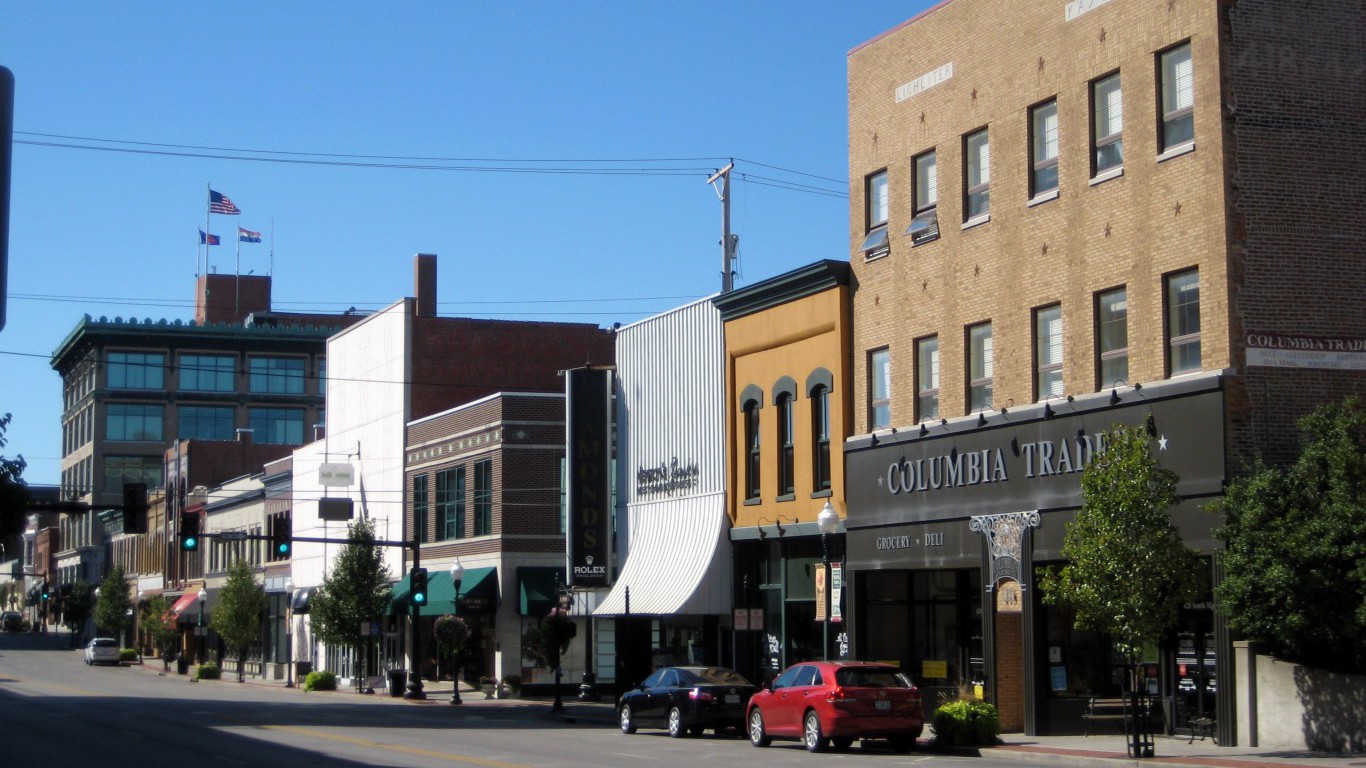
39. Missouri
> Residents who like what they do every day: 73.1% (10th lowest)
> Residents w/ a strong social relationship: 75.9% (13th highest)
> Residents in near perfect physical health: 54.4% (25th highest)
> Poverty rate: 14.0% (22nd highest)
> Violent crime rate: 519.4 per 100,000 (8th highest)
Certain healthy behaviors can be critical to maintaining good physical health, and adults in Missouri are among the least likely to engage in such behaviors. Just 54.2% of respondents in the state eat enough fruits and vegetables on a weekly basis, the fifth smallest share among states. Additionally, only 53.6% of adults in the state get enough exercise, slightly less than the 55.0% of American adults nationwide. Likely partially as a result, Missouri residents are less likely to assess their own health as near-perfect than the typical American adult.
Learning new things every day and relying on your strengths to realize your full potential can greatly increase your sense of purpose. In Missouri, just 65.2% of adults use their strengths every day, and 62.2% learn or do something interesting every day — below the respective 67.5% and 64.8% shares of American adults.
[in-text-ad-2]
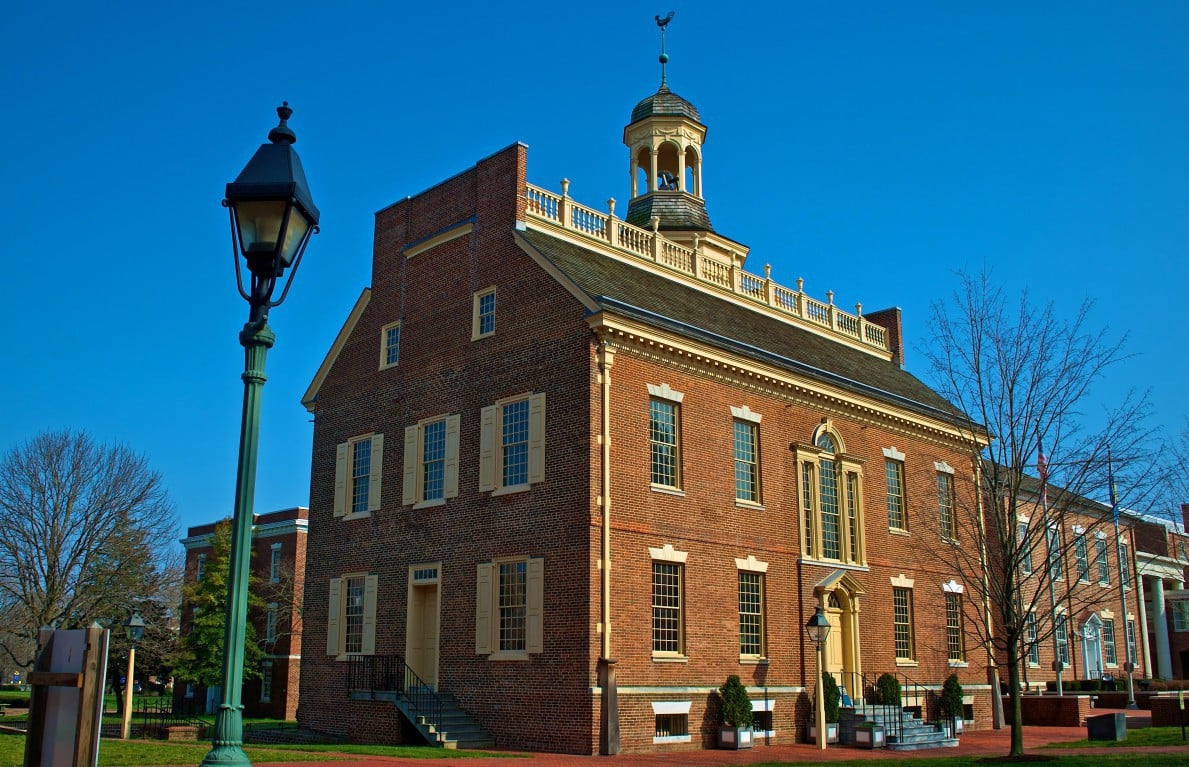
40. Delaware
> Residents who like what they do every day: 71.4% (4th lowest)
> Residents w/ a strong social relationship: 72.2% (3rd lowest)
> Residents in near perfect physical health: 54.7% (20th highest)
> Poverty rate: 11.7% (16th lowest)
> Violent crime rate: 508.8 per 100,000 (9th highest)
The typical Delaware household earns $61,757 a year, over $4,000 more than the national median. While high incomes generally provide residents with a feeling of financial security, adults in Delaware report a higher degree of financial stress than nearly any other state. Approximately 36% of adults regularly worry about money, and 13% are unsatisfied with their standard of living — the fourth and fifth largest shares in the country.
Delaware residents also report far less community pride than the average American. Only 60% of adults in Delaware are proud of their community, and just 73% always feel safe and secure — the fifth and fourth smallest shares of any state. One factor eroding the relationship between Delaware residents and their community may be the state’s high violent crime rate. There were 509 violent crimes per 100,000 residents in 2016, the ninth highest rate of any state.

41. Rhode Island
> Residents who like what they do every day: 74.3% (24th lowest)
> Residents w/ a strong social relationship: 68.5% (the lowest)
> Residents in near perfect physical health: 56.2% (14th highest)
> Poverty rate: 12.8% (22nd lowest)
> Violent crime rate: 238.9 per 100,000 (8th lowest)
While some states in the New England regions, like New Hampshire and Vermont, rank among the states with the highest levels of well-being, nearby Rhode ranks among the lowest. Having a sense of purpose is the most important component of personal well-being, and no state ranks lower in sense of purpose than Rhode Island. Just 50.8% of adults in the state have a leader in their life who makes them feel enthusiastic about the future, the smallest share of any state and well below the comparable 59.5% U.S. share. Similarly, only 48.8% of respondents in the state reached most of their goals in the last year, and 60.4% claim to learn or do something interesting every day — each the third smallest shares among states.
Unfulfilling social connections may undermine residents’ sense of purpose. Just 69.9% of adults in the state get positive energy from friends and family every day, the smallest share of any state.
[in-text-ad]
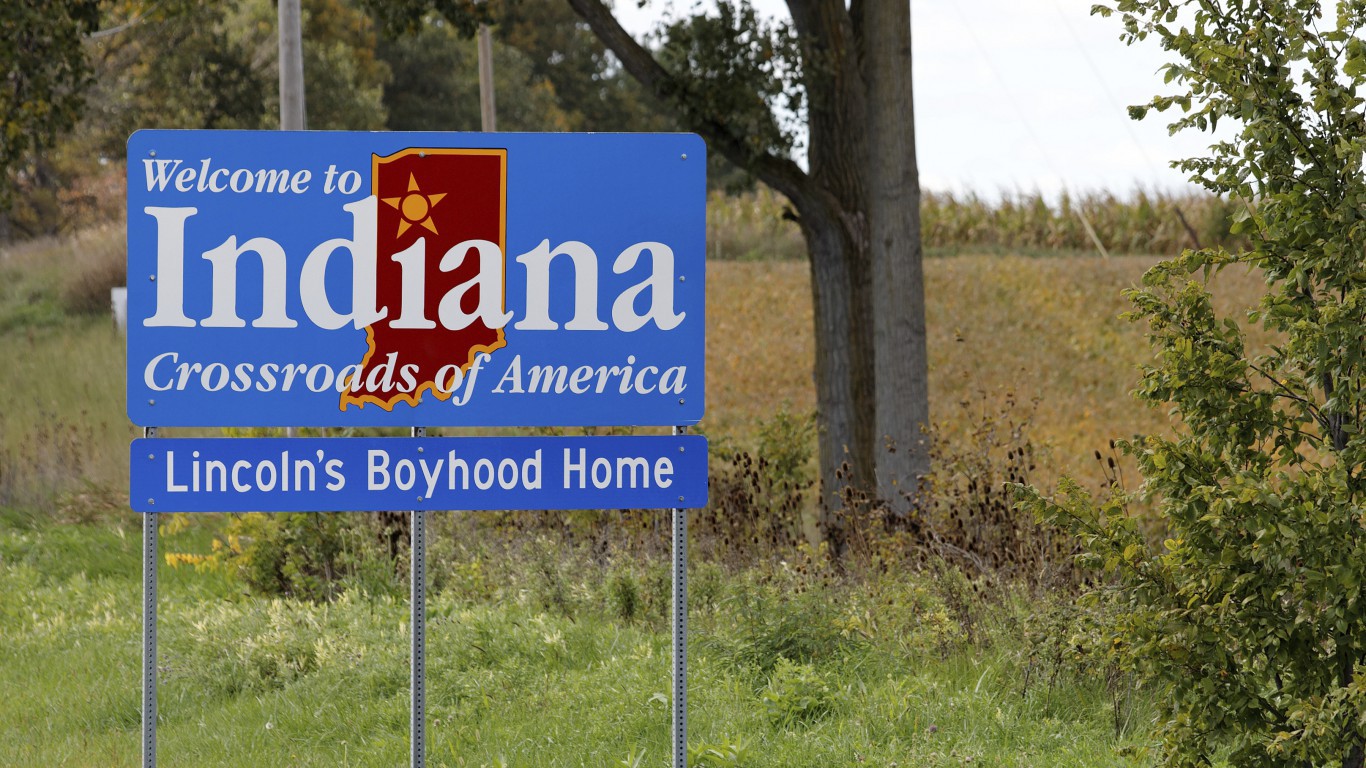
42. Indiana
> Residents who like what they do every day: 73.9% (17th lowest)
> Residents w/ a strong social relationship: 76.2% (11th highest)
> Residents in near perfect physical health: 51.4% (8th lowest)
> Poverty rate: 14.1% (21st highest)
> Violent crime rate: 404.7 per 100,000 (20th highest)
Indiana residents’ overall well-being is undermined in part by a relatively weak connection to the community. Just 62.2% of adults in the state are proud of their community, a smaller share than in the vast majority of states. Without pride in one’s community, the desire to improve it also may be weak. Just 18.4% of survey respondents in the state report receiving recognition for helping to improve their town or community in the last year, the fourth smallest share among states.
Physical health is also an important part of overall well-being, and a relatively large share of Indiana residents are unhealthy. Just 51.4% of adults in the state assess their own physical health as near perfect, the eighth smallest share among states. Similarly, just 64.2% of adults in the state have felt happy and productive in each of the last seven days, the sixth smallest share of any state.

43. Nevada
> Residents who like what they do every day: 73.5% (13th lowest)
> Residents w/ a strong social relationship: 74.0% (12th lowest)
> Residents in near perfect physical health: 50.7% (7th lowest)
> Poverty rate: 13.8% (23rd highest)
> Violent crime rate: 678.1 per 100,000 (3rd highest)
A strong sense of community can go a long way to support personal well-being, but relatively few residents in Nevada feel a close connection to their community. Only 59.4% of respondents are proud of their community, the fourth smallest share of any state. Community pride across the state may be undercut by perceptions of danger. Just 69.5% of adults in the state always feel safe and secure, the second smallest share of any state. Concerns over safety are not unwarranted. There are 678 violent crimes for every 100,000 residents in Nevada per year, well above the U.S. violent crime rate of 397 per 100,000.
Well-being in Nevada is further undermined by fewer strong personal relationships. For example, just 71.9% of adults get positive energy from friends and family every day, the fifth smallest share of any state.

44. Ohio
> Residents who like what they do every day: 71.8% (5th lowest)
> Residents w/ a strong social relationship: 73.1% (7th lowest)
> Residents in near perfect physical health: 52.0% (12th lowest)
> Poverty rate: 14.6% (18th highest)
> Violent crime rate: 300.3 per 100,000 (18th lowest)
A sense of purpose is perhaps the most critical pillar of personal well-being, and a relatively large share of Ohio adults are missing a sense of purpose. For example, just 71.8% of adults in the state like what they do every day, and only 64.4% use their strengths daily to realize their full potential, the fifth and third smallest shares of any state respectively.
Ohio residents are also among the least likely Americans to feel a close connection to their community. Just 59.2% of survey respondents in the state agree that their community or city is the perfect place for them, a considerably smaller share than the 63.7% of Americans who do. Adults in Ohio are also relatively unlikely to make efforts to improve their neighborhoods. Only 17.3% of respondents in the Buckeye State have received recognition in the last year for improving their community, the second smallest share of any state.
[in-text-ad-2]

45. Kentucky
> Residents who like what they do every day: 70.6% (2nd lowest)
> Residents w/ a strong social relationship: 76.0% (12th highest)
> Residents in near perfect physical health: 48.4% (3rd lowest)
> Poverty rate: 18.5% (4th highest)
> Violent crime rate: 232.3 per 100,000 (7th lowest)
Using your strengths and enjoying what you do every day can greatly contribute to a sense of purpose — one of the most important pillars of personal well-being. In Kentucky, just 70.6% of adults like what they do every day, and 63.3% use their strengths to maximize their potential every day — the second smallest and smallest shares of any state, respectively. The relatively weak sense of purpose may partially explain the prevalence of depression in the state. Some 23% of respondents in Kentucky have had a depression in their lifetime, the fourth largest share of any state.
In addition, many also likely suffer from poor physical health. Only 48.4% of respondents in Kentucky assess their own physical health as near-perfect, the third smallest share of any state. Suboptimal health, for many, may be attributable to unhealthy habits. For example, just 57.4% of adults in the state eat healthily all day, the third smallest share of any state.

46. Oklahoma
> Residents who like what they do every day: 74.1% (18th lowest)
> Residents w/ a strong social relationship: 74.8% (23rd lowest)
> Residents in near perfect physical health: 47.7% (2nd lowest)
> Poverty rate: 16.3% (9th highest)
> Violent crime rate: 449.8 per 100,000 (14th highest)
Over 16% Oklahoma residents live on poverty level incomes, well above the 14.0% U.S. poverty rate. Poorer Americans are less likely to report a high sense of well-being than higher earning Americans, and the low incomes in Oklahoma may explain some negative outcomes. Only 38.2% of adults in the state have enough money to do what they want, nearly the lowest share nationwide. Additionally, 1 in every 5 survey respondents struggle to afford food, the fourth highest ratio of any state.
Stronger social connections would also go a long way to improve well-being in the Sooner State. Just 42.7% of survey respondents always make time for regular vacations with family and friends, the smallest share of any state. Additionally, just 71.2% of adults in the state receive positive energy from friends and family on a daily basis, the fourth smallest share among states.
[in-text-ad]

47. Mississippi
> Residents who like what they do every day: 69.8% (the lowest)
> Residents w/ a strong social relationship: 71.4% (2nd lowest)
> Residents in near perfect physical health: 51.4% (9th lowest)
> Poverty rate: 20.8% (the highest)
> Violent crime rate: 280.5 per 100,000 (15th lowest)
Poorer Americans are less likely than those with higher incomes to report a high level of personal well-being. With about 1 in 5 residents living below the poverty line, Mississippi is the poorest state in the country. Partly as a result, it is the only state where fewer than 1 in 3 adults do not have enough money to do what they want. Additionally, some 23% of survey respondents report struggling to afford food, the largest share of any state.
Many Mississippi residents also lack a sense of purpose. It is the only state in the country where fewer than 70% of survey respondents said they like what they do every day. It is also one of only three state where less than half of adults have reached most of their goals in the past year.

48. Arkansas
> Residents who like what they do every day: 71.9% (6th lowest)
> Residents w/ a strong social relationship: 74.6% (20th lowest)
> Residents in near perfect physical health: 48.6% (4th lowest)
> Poverty rate: 17.2% (6th highest)
> Violent crime rate: 550.9 per 100,000 (6th highest)
Arkansas residents have some of the worst health behaviors in the country and report some of the worst health outcomes. For example, 31% of adults in the state get no exercise beyond getting up and going to work, and 32% have had to abstain from their usual activities for more than two days due to poor health — both the second largest shares of any state. Nationwide, just 26.0% of Americans missed their usual activities due to poor health. Additionally, 39% of adults have had high blood pressure at some point in their lives, and 15% have diabetes — each the third largest share nationwide.
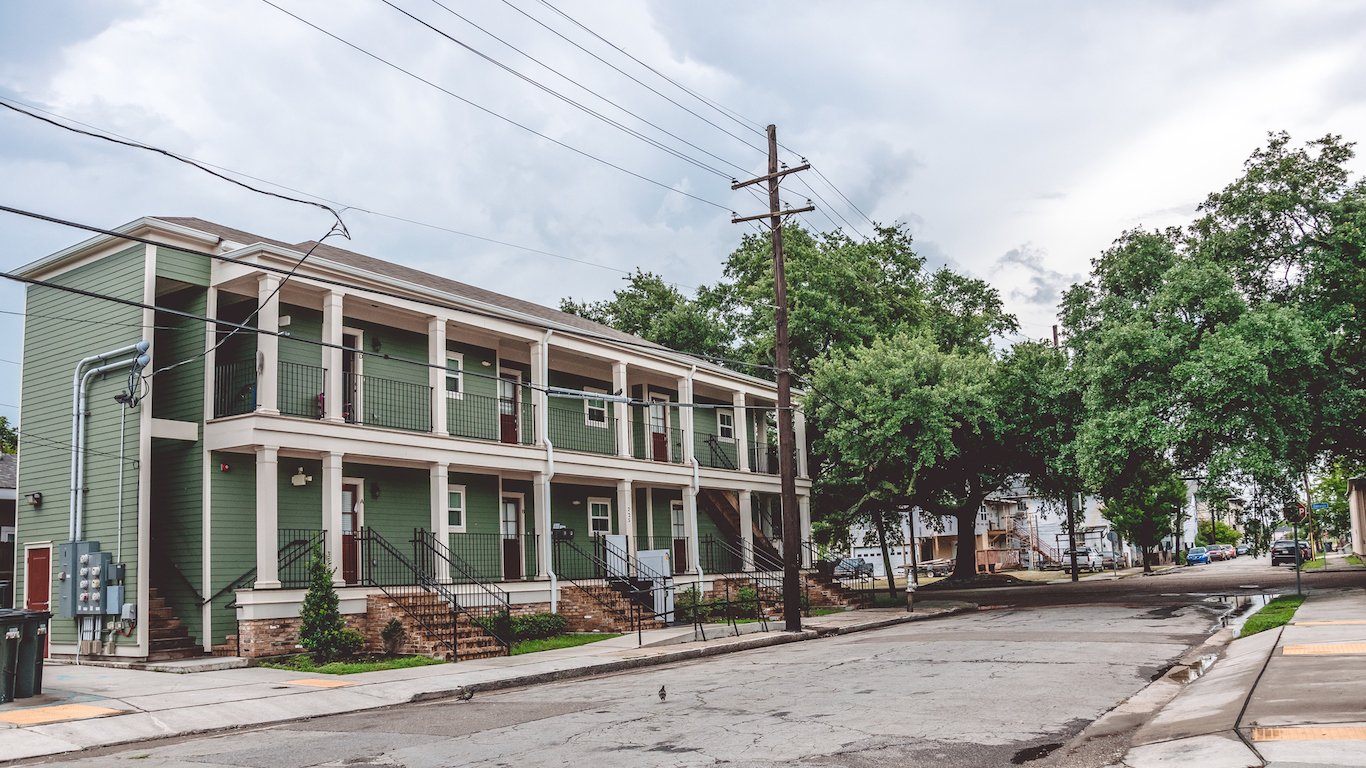
49. Louisiana
> Residents who like what they do every day: 71.9% (7th lowest)
> Residents w/ a strong social relationship: 73.3% (8th lowest)
> Residents in near perfect physical health: 52.6% (15th lowest)
> Poverty rate: 20.2% (2nd highest)
> Violent crime rate: 566.1 per 100,000 (5th highest)
Louisiana is one of many states in the South that trail the nation in well-being. Just an estimated 55.4% of adults believe the area where they live is the perfect place for them, and only 69.3% always feel safe and secure — each the smallest share of any state. The fractured sense of safety may be partially due to the area’s high crime rate. There were 566 violent and 3,298 property crimes per 100,000 Louisiana residents in 2016, the fifth and fourth highest such rates of any state.
Louisiana residents also report the weakest sense of financial security of any state other than Mississippi. More than 1 resident in 5 in the state live in poverty, the second highest poverty rate in the country.
[in-text-ad-2]

50. West Virginia
> Residents who like what they do every day: 71.3% (3rd lowest)
> Residents w/ a strong social relationship: 74.6% (18th lowest)
> Residents in near perfect physical health: 47.4% (the lowest)
> Poverty rate: 17.9% (5th highest)
> Violent crime rate: 358.1 per 100,000 (24th lowest)
For the ninth year in a row, West Virginia residents reported the lowest level of well-being in 2017. Well-being in the state is largely hindered by high levels of financial insecurity and poor physical health. The typical West Virginia household earns just $43,385 a year, more than $14,000 less than the national median income of $57,617. Even adjusted for the area’s low cost of living — goods and services cost an average 11% less in the state than they do nationwide — West Virginia still has the second lowest median household income in the country. Some 21% of adults believe they do not have enough money for food, the third largest share of any state.
In West Virginia, 28% of adults smoke, and 29% get no exercise beyond getting up and going to work — the largest and fourth largest such shares in the country. The state has the highest self-reported rates of high blood pressure, diabetes, depression, and heart attack, and just 47% of adults believe they are in near-perfect physical health — the smallest share of any state.
Detailed Findings & Methodology
In an interview with 24/7 Wall St., Dan Witters, research director of the Gallup-Sharecare Well-Being Index, identified sense of purpose as the clearest indicator of overall well-being. “If I had to pick one of the five elements to start with and build from scratch, it would be purpose.” Sense of purpose correlates with overall well-being more than any of the other four elements. This is likely because sense of purpose determines so many other factors in an individual’s life.
“Are you learning and growing? Are you reaching goals? Are you in a role where you’re able to use your natural strengths every day?” Witters explained. Individuals with a strong sense of purpose are more likely to have higher incomes, be in better physical shape, have ties to their community, and have strong social relationships.
Another of the five elements of well-being is financial security. Statements such as “You have enough money to do everything you want to do,” and “In the last seven days, you have worried about money,” which participants agree or disagree with on a scale of 1 to 5, give an insight into how well individuals manage their economic life to reduce stress and increase financial security. Financial security is highly correlated with external factors such as income and cost of living. Of the 25 states reporting the highest degrees of financial security, 20 have median household incomes greater than the national median income of $57,617 when adjusted for cost of living.
Connection to one’s community is another important element in overall well-being. Survey respondents were asked to agree or disagree with statements such as “You are proud of your community,” and “You always feel safe and secure,” on a scale of 1 to 5 to give an indication of how much they like where they live, feel safe, and have pride in their community. One factor that can significantly erode an individual’s bond with his or her community is crime. Of the 15 states with the strongest sense of community, 13 have lower violent crime rates than the national rate, and 10 have lower property crime rates as well.
Unemployment is also one of the major external factors that correlates with overall well-being. “Having a job is better for your well-being than not having a job if you need one,” Witters said. A large number of residents with high well-being can also attract new industry to a given area, which can in turn help keep unemployment low. “States that have high well-being residents are attractive places for would-be employers because their workers perform better and have fewer unplanned absences,” Witters said. All 10 of the states with the highest overall well-being have unemployment rates below the national unemployment rate for 2016 of 4.9%.
According to Witters, factors that highly correlate with overall well-being also include educational attainment, motor vehicle deaths, driving under the influence, and teen pregnancies.
To determine America’s happiest and most miserable states, 24/7 Wall St. analyzed the results of the Gallup-Sharecare Well-Being Index. States were ranked based on their overall Well-Being Index score. Survey results from Gallup were paired with other socioeconomic data from the U.S. Census Bureau, the FBI, and other sources. Data on median household income, college and high school attainment, commuting patterns, poverty, households earning less than $10,000 and households earning more than $200,000, and income inequality came from the Census Bureau’s 2016 American Community Survey. Data on unemployment came from the Bureau of Labor Statistics and is an annual average for 2016. Data on regional price parity came from the Bureau of Economic Statistics and is for 2015. Data on violent crime and property crime came from the FBI’s 2016 Uniform Crime Report. Data on physical inactivity, access to physical activity locations, premature mortality, and children in single-parent households came from the 2017 edition of County Health Rankings & Roadmaps, a joint program of the Robert Wood Johnson Foundation and University of Wisconsin Population Health Institute. All data are for the most recent period available.
Sponsored: Attention Savvy Investors: Speak to 3 Financial Experts – FREE
Ever wanted an extra set of eyes on an investment you’re considering? Now you can speak with up to 3 financial experts in your area for FREE. By simply
clicking here you can begin to match with financial professionals who can help guide you through the financial decisions you’re making. And the best part? The first conversation with them is free.
Click here to match with up to 3 financial pros who would be excited to help you make financial decisions.
Thank you for reading! Have some feedback for us?
Contact the 24/7 Wall St. editorial team.
 24/7 Wall St.
24/7 Wall St. 24/7 Wall St.
24/7 Wall St. 24/7 Wall St.
24/7 Wall St. 24/7 Wall St.
24/7 Wall St. 24/7 Wall St.
24/7 Wall St. 24/7 Wall St.
24/7 Wall St.
